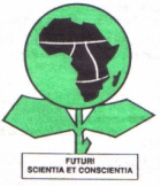
African Institute for Future Studies
Encyclopedia
The African Institute for Future Studies, also known as Panafrican Institute for Future Studies or INADEP, is a research institution and university founded in 1989 by the President of Zaire (present day Democratic Republic of the Congo
) (Ordinance 89–287 of 9 November 1989). It is located in Kinshasa
, Democratic Republic of the Congo
, though it was originally located in Zomba, Malawi
. In addition to subsidiary departments that are funded for the future studies or for the exploration of the future, INADEP has funded a Centre for the exploration of the past, named Diop's Center for Egyptology. INADEP is a member of the National Research Council of Congo and one of the National Government Organizations devoted exclusively to scientific research and to the training of new researchers.
Ordinance 89–287 of 9 November 1989 prescribed the foundation of a public institution called Institut Africain d'Etudes Prospectives (INADEP), and in 1990 the Center for Egyptology was added. The chairman of the Centre for Egyptology is Mubabinge Bilolo.
Democratic Republic of the Congo
The Democratic Republic of the Congo is a state located in Central Africa. It is the second largest country in Africa by area and the eleventh largest in the world...
) (Ordinance 89–287 of 9 November 1989). It is located in Kinshasa
Kinshasa
Kinshasa is the capital and largest city of the Democratic Republic of the Congo. The city is located on the Congo River....
, Democratic Republic of the Congo
Democratic Republic of the Congo
The Democratic Republic of the Congo is a state located in Central Africa. It is the second largest country in Africa by area and the eleventh largest in the world...
, though it was originally located in Zomba, Malawi
Malawi
The Republic of Malawi is a landlocked country in southeast Africa that was formerly known as Nyasaland. It is bordered by Zambia to the northwest, Tanzania to the northeast, and Mozambique on the east, south and west. The country is separated from Tanzania and Mozambique by Lake Malawi. Its size...
. In addition to subsidiary departments that are funded for the future studies or for the exploration of the future, INADEP has funded a Centre for the exploration of the past, named Diop's Center for Egyptology. INADEP is a member of the National Research Council of Congo and one of the National Government Organizations devoted exclusively to scientific research and to the training of new researchers.
Origin
In 1976 the United Nations, through its Economic Commission for Africa (EGA) launched the idea of founding an African Institute for Studies of the Future. In 1977, the IXth Conference for ECA ministers defined the objectives of the Institute. In 1980m Professor Mahdi Elmandjra conducted a feasibility study entitled Report on the Desirability and Feasibility of Establishing an African Institute for Advanced public Policy Analysis and Future Studies. In 1981, the OAU summit held in Nairobi approved the idea of founding an Institute for decolonising the future. In 1982, the Conference for EGA Ministers approved the idea of establishing the Institute. In 1987 the book Reconquering the Future was published at the request of UNDP.Foundation
In 1985, the International Symposium on Africa and its Future thinks it is appropriate to start an African Centre for Studies of the Future. President Mobutu Sese Seko agrees to the idea and offers to provide initial infrastructural facilities in Kinshasa.Ordinance 89–287 of 9 November 1989 prescribed the foundation of a public institution called Institut Africain d'Etudes Prospectives (INADEP), and in 1990 the Center for Egyptology was added. The chairman of the Centre for Egyptology is Mubabinge Bilolo.
Objectives
The Institute is an Africa-oriented study centre and, as such, pursues the following main objectives:- Provide institutional facilities for long term research on international, political, cultural, economic, sociological, and technical modifications to the African or world situation in the present or in the future
- assess strategies, indicate the various options available, and offer a just and balanced picture of the future as well as propose directives for a planified realisation of the objectives proposed
Support
The INADEP receives support and encouragement from international institutions such as UNDP, OAU, EGA, UNESCO, UNICEF, ABDA, ABD, EEC, and the World Bank. It also receives support from specialised centres in France, Great Britain, Germany, the United States, Scandinavian Countries, Japan, and the Soviet Union.Immediate actions
The programme includes a campaign for the cohesion of African countries and for obtaining of assistance expected from international organisations.Departments of the institute
- Documentation and basic equipment department
- Centre for computerised data
- Research units
Activities
- General concepts and methods of future studies
- Analysis and definition of Main Directions of development
- Bibliologie or graphic communication
- Training by means of conferences, retraining and in-service sessions, short courses, and other means
- Organisation of colloquia and symposia
- Studies for the prevention of social deviance
- Publication of Editions Universitaires Africaines /EDUAF

